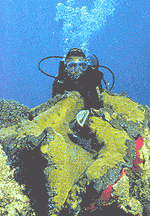Hot Spot
TIME, Jul. 08, 2002
By DAMASO REYES Self-Destruction While the island of Selayar is largely unsullied by human development, the same cannot be said of its surrounding coral reefs. It only takes a quick peek below the surface of the island's tranquil waters to see the devastating consequences of unfettered local fishing practices. The sea floor off the coast, once heralded as one of Sulawesi's richest reefs, is now a barren, white wasteland of shattered coral, eerie stillness and craters the size of a child's inflatable wading pool. The effects of dynamite fishing are hard to miss.
Self-Destruction While the island of Selayar is largely unsullied by human development, the same cannot be said of its surrounding coral reefs. It only takes a quick peek below the surface of the island's tranquil waters to see the devastating consequences of unfettered local fishing practices. The sea floor off the coast, once heralded as one of Sulawesi's richest reefs, is now a barren, white wasteland of shattered coral, eerie stillness and craters the size of a child's inflatable wading pool. The effects of dynamite fishing are hard to miss.
For years, a growing number of fishermen have been using explosive devices here to stun their prey and bring it to the surface. It takes only a few hours to bomb out an area of hundreds of square meters, securing a full haul but causing irreparable damage to the live coral at the base of a reef's ecosystem. Fishermen use homemade fertilizer bombs, dynamite and even ordnance left over from World War II. The return is quick and lucrative, netting them many times over what they would make using conventional methods. But once bombed, the area is devoid of life for decades.
Environmentalists have lobbied the Indonesian government for years to police these waters more vigilantly, but to little effect. With more than 81,000 square kilometers of coastline and 17,000 islands to patrol, the Department of Fisheries faces a herculean task, and it doesn't cost much to avert the eyes of a prying inspector. Marine biologists estimate that well in excess of half of the nation's coral reefs suffer some damage from dynamiting. Environmental education programs are having some effect, but international demand and a willingness to pay top dollar for reef delicacies like the napoleon wrasse make it difficult for conservationists to get their message across. Over the past 10 years the situation has worsened. The coral reefs of Indonesia may ultimately be a tourist destination akin to the Amazon rain forests: see them while they still exist.
No comments:
Post a Comment